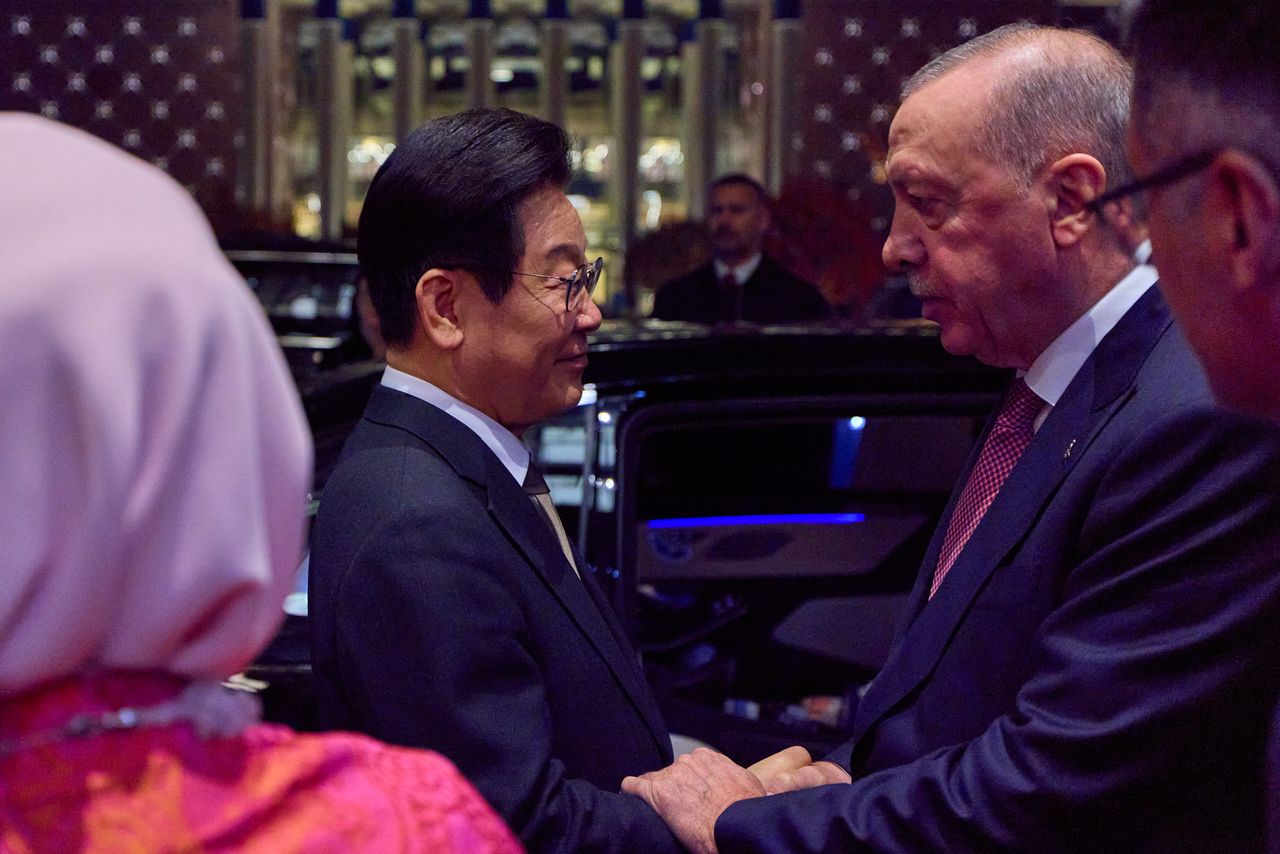 As President Lee Jae Myung ended his 10-day, four-nation trip to the Middle East and Africa, South Korea sought to underscore regional ties, especially in the fields of defense and nuclear energy.
As President Lee Jae Myung ended his 10-day, four-nation trip to the Middle East and Africa, South Korea sought to underscore regional ties, especially in the fields of defense and nuclear energy.
On the final leg of the trip in Turkey, which ended late Tuesday, Lee and Turkey’s President Recep Tayyip Erdogan agreed to deepen the two countries’ strategic partnership and bolster ties in multiple fields, including defense, nuclear power, biotechnology and renewable energy.
Addressing the media after the summit, the leaders shared that a joint statement has been adopted on the strategic partnership between the two nations.
“I firmly believe that the joint statement will serve as a good guideline for carrying out the matters discussed in today’s summit meeting,” Lee said.
The two sides also agreed to resume their joint economic committee for the first time in 10 years to monitor and carry out cooperation in the designated fields.
Multiple memorandums of understanding were also signed between the two nations, including one seeking Turkey’s support for South Korean firms to undergo detailed evaluation processes regarding the Sinop Nuclear Power Plant project on the northern shores of Turkey.
“I look forward to Korea’s outstanding nuclear technology and operational safety capabilities contributing substantially to the development of Turkey’s nuclear energy,” Lee told a joint press conference Monday. Erdogan also called the agreement “an important step forward.”
Lee added that the two leaders had agreed to continue cooperation on joint production, technological collaboration and personnel training exchanges to boost the defense capabilities of both countries, as seen in the Altay main battle tank production that started in September.
In non-business sectors, Lee and Erdogan agreed to strengthen humanitarian assistance to resolve Syrian refugee issues in Turkey, boost people-to-people and cultural exchanges, and strengthen cooperation through a memorandum on honoring and assisting war veterans.
A similar theme was visible in Lee’s meetings with leaders of the United Arab Emirates and Egypt, held before the G20 summit in Johannesburg, South Africa.
In the UAE, Lee and his Emirati counterpart Mohammed bin Zayed Al Nahyan on Nov. 18 agreed to seek up to $15 billion worth of defense contracts in third countries through joint development, technology cooperation and local production. This took the level of bilateral defense collaboration to a higher level, which went “even beyond sales of weapons” according to the joint statement, given that the UAE has been considered one of the key importers of South Korea-made defense equipments such as Chunmoo multiple rocket launcher and the Cheongung-II surface-to-air missile system.
Such models for joint production in the field of defense have already been in practice in the Middle Eastern region, as Lee sought to expand cooperation based on such track records.
In Egypt, Lee on Thursday hailed the joint production of the K-9 self-propelled howitzer, during his joint press conference with Egyptian President Abdel Fattah el-Sissi. Such defense ties, Lee added, could expand through Egypt’s introduction of other South Korea-made equipment such as FA-50 light aircraft and the Cheongeom air-launched anti-tank guided missile.
Ending his Group of 20 Summit attendance over the weekend in Johannesburg, that his push for defense cooperation with multiple partners comes amid “unexpected and sudden changes” not only in the Middle East but also in other countries.
“The demand for defense industries in each country is growing faster than anticipated,” Lee said. “As the level of the threat (of national insecurity) intensifies, so does their interest (in national defense). I believe this will be very helpful in developing inter-country relations.”
As with Turkey, South Korea and UAE agreed to jointly enter third-country markets for nuclear power plant exports. This builds on the foundation of the success in the commercial power plant construction in UAE, as the Barakah nuclear power plant fulfills about a fourth of the country’s electricity needs since last year after 12 years of construction.
While memorandums of understanding are often part of summit meetings, an expert said that documents signed during the president’s visit to a country for a summit might be holding greater significance than they used to.
“Expectations for follow-up work resulting from the visit were essentially low in the past,” said Eom Ki-hong, a political science professor, at Kyungpook National University. “While diplomatic negotiations in the past merely had symbolic significance, today’s meetings between leaders have a greater chance of actually leading to substantive outcomes.”
He added this might stem from the United States’ growing reliance on its alliance to reduce its own costs and instead allow its allies like South Korea to take on the roles it had played.
- Unification minister meets US envoy, stresses bilateral cooperation in resuming US-NK dialogue
- Lee pays tribute at Korean War Memorial in Ankara
- S. Korea asks Lone Star to reimburse legal costs after winning annulment in investor dispute
- Samsung, Reliance chiefs push deeper AI-chip alliance
- [Stars up close] Why Park Jeong-min is going viral as Korea’s most down-to-earth star









Most Commented